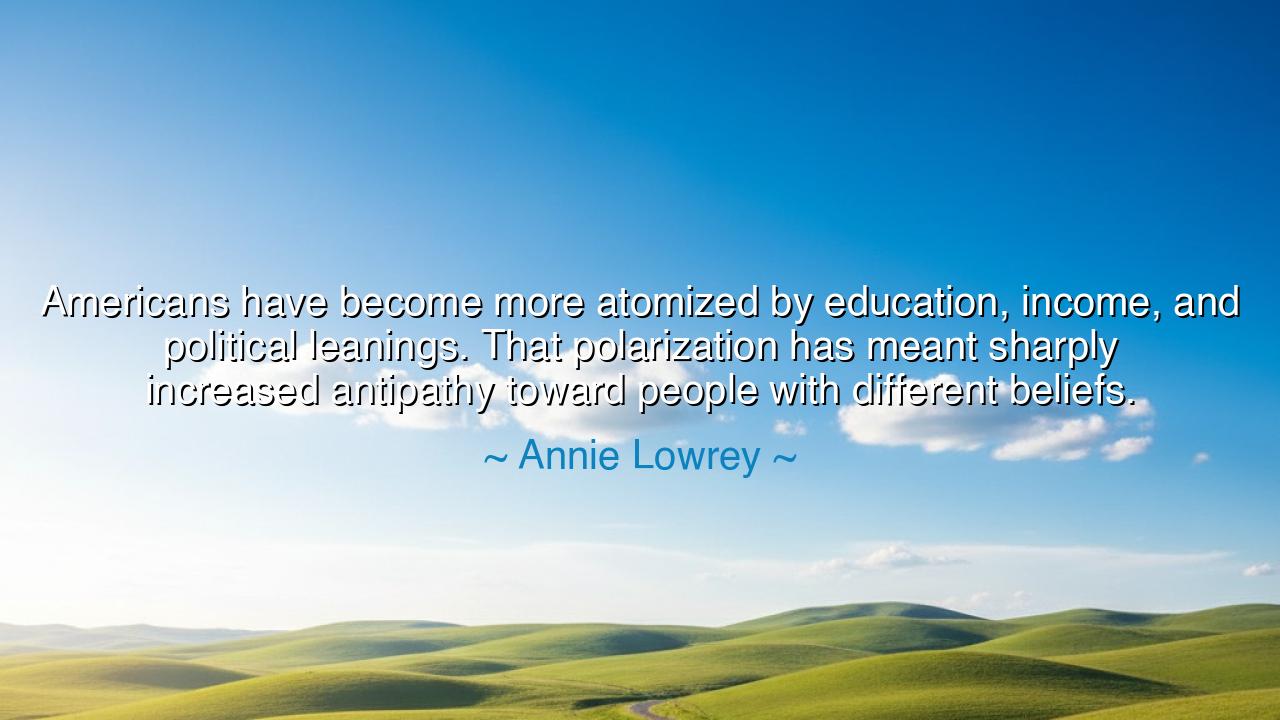
Americans have become more atomized by education, income, and
Americans have become more atomized by education, income, and political leanings. That polarization has meant sharply increased antipathy toward people with different beliefs.






The words of Annie Lowrey sound like a warning carried on the winds of history: “Americans have become more atomized by education, income, and political leanings. That polarization has meant sharply increased antipathy toward people with different beliefs.” In this, she names a fracture at the heart of modern society—the breaking apart of one people into many tribes, divided not by mountains or oceans, but by walls of thought, wealth, and ideology. She sees the danger not only in the differences themselves, but in the antipathy, the rising hatred and mistrust that now poisons the common well.
The word atomized is rich with meaning. Once, to be a citizen was to be part of a whole, joined in community and purpose. To be atomized is to be broken into fragments, like a shattered vessel, where each piece stands apart, sharp and alone. Lowrey declares that education, wealth, and politics—forces that could unite and elevate—have instead become lines of division. The learned look down upon the unlearned, the wealthy upon the poor, the left upon the right, and the right upon the left. Where there should be dialogue, there is contempt. Where there should be empathy, there is enmity.
History shows us the peril of such division. In the final days of the Roman Republic, class and ideology tore the people apart. The wealthy patricians despised the plebeians; factions formed around competing leaders; civil wars erupted again and again. Rome, once mighty, crumbled not from the strength of her enemies but from her own polarization. The republic’s greatness was dissolved by internal contempt, just as Lowrey warns America may suffer when citizens turn against one another, seeing not fellow humans, but enemies defined by difference.
Yet history also gives us examples of healing. In the early years after the American Civil War, the wounds of slavery and secession threatened to keep the nation in permanent division. But through painstaking acts of reconciliation, through the slow rebuilding of institutions, and through the determination of ordinary citizens, the country found ways to reunite—imperfectly, but with enough strength to continue. This shows us that though atomization and hatred can rise, they can also be overcome, if there is the will to seek common purpose.
The deeper meaning of Lowrey’s words is that antipathy is more dangerous than difference. Human beings will always disagree, for no two lives are shaped alike. But when disagreement turns to disdain, and disdain to hatred, the bonds of community rot away. A people can endure different faiths, incomes, or parties—but they cannot endure if those differences make them despise one another. Hatred is the acid that dissolves the vessel of society.
The lesson for us is urgent: we must resist the temptation of contempt. If you are educated, do not scorn the uneducated; if you are wealthy, do not dismiss the poor; if your politics are strong, do not see all opponents as enemies. Remember that beneath these differences lies a shared humanity, a shared fate. The republic cannot endure if each citizen sees his neighbor as an enemy to be defeated rather than a fellow traveler to be persuaded.
Therefore, O listener, let Lowrey’s words awaken vigilance within you. Strive to build bridges where others build walls. Seek to listen when others shout. Hold firm to your beliefs, but hold fast also to compassion. For a society divided by hatred is a society that cannot endure. Let differences sharpen the mind, but never let them harden the heart. Only then can a people remain strong, united not by sameness, but by the deeper bond of mutual respect and shared destiny.






AAdministratorAdministrator
Welcome, honored guests. Please leave a comment, we will respond soon